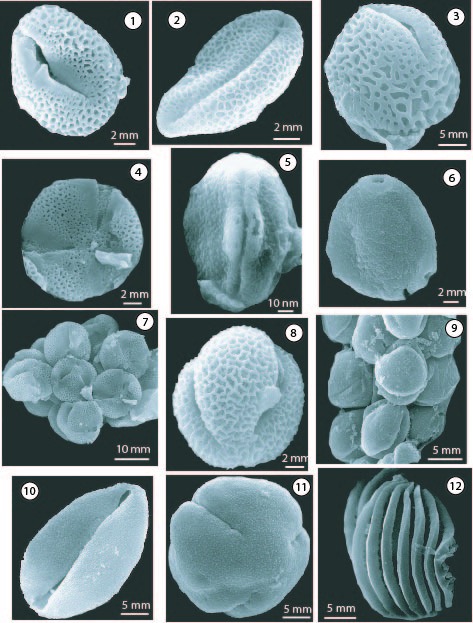 Pictured are fossil angiosperm pollen from the Late Cretaceous McNairy Member from Northeastern Mississippi. These scanning electron microscope photos were taken by Dr. Nina Baghai-Riding and her students.
Pictured are fossil angiosperm pollen from the Late Cretaceous McNairy Member from Northeastern Mississippi. These scanning electron microscope photos were taken by Dr. Nina Baghai-Riding and her students.A group of Delta State University faculty members recently secured funding that will be used to enhance research experiences and increase students’ interest in science, technology, engineering and mathematics (STEM) programs.
In mid-November, DSU’s Professor of Biology and Environmental Science Dr. Nina Baghai-Riding, Associate Professor of Analytical Chemistry Dr. Chuck Smithhart and Biology Instructor Miller Maddox-Mandolini received notice that their proposal, “Incorporating the JEOL Scanning Electron Microscope into Science Curricula at Delta State University” had been awarded $22,500 from the Mississippi IDeA Networks of Biomedical Research Excellence (INBRE).
The funding will be used to teach and train students in Environmental Science, Chemistry, and Biology about scanning electron microscopy (SEM) imaging and x-ray analysis with the JEOL JSM-6010PLUS/LA scanning electron microscope SEM.
The SEM, currently housed in DSU’s Walters Hall, was acquired with funding through a Major Research Instrumentation grant award from the National Science Foundation during the 2013-2014 academic year.
“Maintaining the SEM is expensive,” said Baghai-Riding. “Funds from the MS INBRE grant will be used to replace a backscattered electron detector, apertures, a scintillator, and filaments. A gold source plate for the specimen sputter coater and an electric muffle furnace with custom alumina plates and risers also will be acquired.”
Faculty at DSU will incorporate the SEM into freshman classes including Principles of Biology and Biology of Human Concerns as well as advanced Biology, Chemistry, and Environmental Science courses in Spring 2021 and during the 2021-2022 academic year.
The tool will broaden students’ experience with regard to scientific method procedures and applications. Students will prepare test samples for analysis, comprehend how electron and x-ray detectors operate, interpret and photograph features of cells, help to create an image library of SEM photographs for on-line databases and more.
“There is not another SEM within a 150-mile radius that is accessible to DSU students. The SEM at DSU has made a positive difference in classroom instruction, scientific outreach, and research,” said Dr. Baghai-Riding
“DSU science students are often successful in obtaining employment in government and industry and are accepted into graduate programs partly because of their expertise with sophisticated scientific equipment such as the SEM,” she added.
Past projects that incorporated the SEM includes analyzing the scat of predatory coyote to determine dietary preferences, deducing the ash content of jam/jelly samples throughout the United States and correlating that data to their respective soils; interpreting the past climates and environments by analyzing fossil pollen and spores; investigating fine details of leaf surfaces from local bottomland hardwood forests; studying caveolae both in cultured cells and in muscle tissue samples with regards to obesity; determining the identity and location of heavy metals incorporated into the mandibles of termites; and discovering microstructural and organizational differences of materials.
Supporting letters for the INBRE grant were written by Drs. Kuan-Hui Chen and Dafang Faith Wang with DSU’s Division of Math and Sciences, Dr. Mac Alford, professor of biology at the University of Southern Mississippi, Dr. Sharon Hamilton, assistant professor of chemistry at Ouachita Baptist University, and James Starnes, director of surface geology and surface mapping with the Mississippi Office of Geology (State Survey).
Mississippi INBRE is a network of colleges and universities, designed to build a biomedical research infrastructure in Mississippi.
Curriculum development grants provided by INBRE are designed to support course creation or enhancement as well as workshops at undergraduate institutions in all areas of science, technology, engineering and mathematics (STEM) education.
For more information about the Mississippi INBRE, visit www.msinbre.org.
To learn more about DSU’s Division of Math and Sciences, visit www.deltastate.edu/artsandsciences/mathematics-and-sciences.

